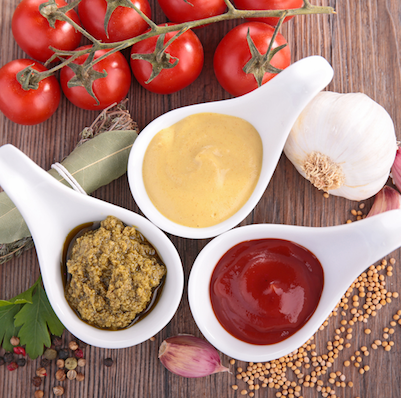Keeping Cookout Condiments Safe To Eat

Imagine that it’s a hot summer day, perfect for backyard barbecuing. You swing by the grill, where the designated grill-master flips your burger or dog onto a bun, and then you head to the condiment table!
There sits the ketchup, mustard, mayo and relish, basking in the hot sun. It is a food safety rule that food should not sit out for more than 2 hours at room temperature (or 1 hour above 90 degrees Fahrenheit) without refrigeration or a heating source. If this rule is broken, there’s a good chance the food can grow harmful bacteria and possibly make you sick. Many think this rule only applies to hot and cold dishes like entrees and salads, but this rule also applies to many condiments and dips.
The safe condiments.
Ketchup, mustard and relish have an acidity level that makes them shelf stable and staves off spoilage. However, while they may be safe to eat after sitting in the sun, these products should be refrigerated after opening to maintain quality.
What condiments need extra care?
If thoughts of “too-tangy” potato salad make you feel queasy, it’s because the mayo has been sitting out in the heat for too long. Egg and dairy based products, like mayo, creamy dressings and cole slaws need to be kept chilled, and shouldn’t be left out for longer than two hours (1 hour if the temperature reaches above 90 degrees). Hummus has a high protein content, which encourages the growth of bacteria even at room temperature. Your favorite Mediterranean bean dip also contains olive oil, which may become rancid if left in the heat. If it’s not in the cooler or being held on ice, then after 2 hours it should be tossed.
Keep it cool!
So what should you do with those at-risk items? Grab a bucket or large pan and fill it with ice and place those “at-risk” condiments inside. Ideally, the products should be held at 41 degrees Farenheit or below, but in the absence of a kitchen thermometer, keep an eye on the ice and replace it when it begins to melt. Discard any remaining items if they have been sitting out in warm melted ice water.
Avoid cross-contamination.
One last condiment to consider is your favorite marinade. If you marinate raw meat, be careful that the sauces that have touched the raw meat are kept away from other nearby foods. Once you place the meat on the grill, discard any leftover marinade. Do not use it on another type of food, as this encourages the spread of bacteria.
Summer is a time to enjoy the outdoors. Make sure your favorite condiments are kept delicious and safe, so you can slather with confidence!